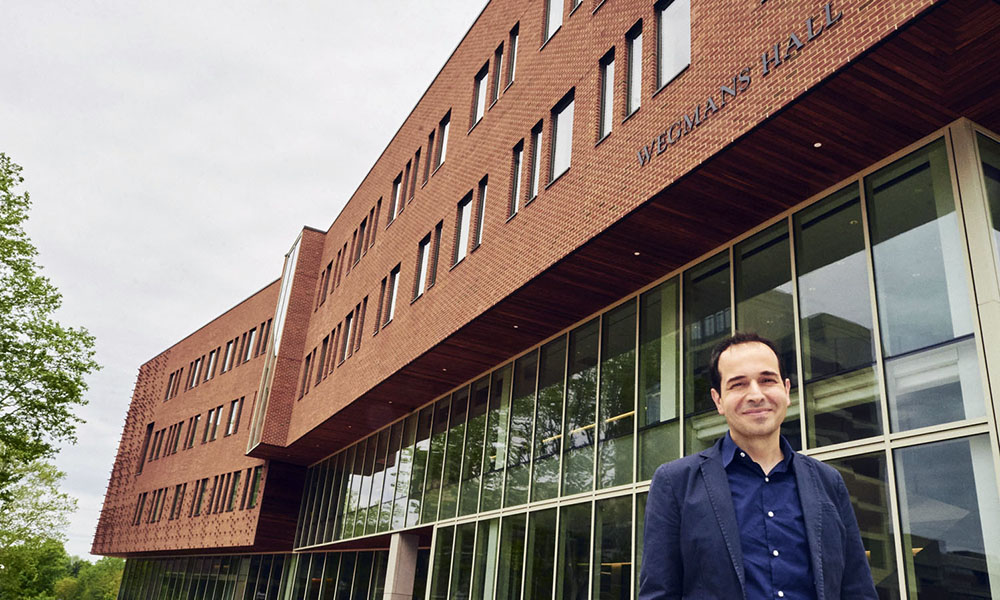The University’s Goergen Institute for Data Science supports collaborative projects across all disciplines.

Ten projects supported with seed funding from the Goergen Institute for Data Science this year demonstrate how machine learning, artificial intelligence (AI), and augmented and virtual reality (AR/VR) are transforming the way University of Rochester researchers—across all disciplines—address challenging problems.
“I’m very excited about the wide range of collaborative projects we are able to support this year,” says Mujdat Cetin, the Robin and Tim Wentworth Director of the institute. “These projects tackle important and timely problems on data science methods and applications, and I am confident they will lead to significant research contributions and attract external funding.”
The awards, approximately $20,000 each, help researchers generate sufficient proof-of-concept findings to then attract major external funding.
This year’s projects involve collaborations among engineers, computer scientists, a historian, a biostatistician, and experts in brain and cognitive sciences, earth and environmental science, and palliative care. Their projects include a totally new kind of computing platform, new virtual reality technologies to improve doctor-patient conversations and help people overcome color vision deficiency, and machine learning techniques to make it easier for people to add music to their videos and to enhance AR/VR immersive experiences based on the unique geometry of each user’s anatomy.
The 2022–23 funded projects and their principal investigators are:
- Ising Boltzmann Substrate for Energy-Based Models
Co-PIs: Michael Huang, professor of electrical and computer engineering and of computer science, and Gonzalo Mateos, associate professor of electrical and computer engineering and of computer science and the Asaro Biggar Family Fellow in Data Science - A Data-Driven, Virtual Reality-based Approach to Enhance Deficient Color Vision
Co-PIs: Yuhao Zhu, assistant professor of computer science, and Gaurav Sharma, professor of electrical and computer engineering, of computer science, and of biostatistics and computational biology - Audiovisual Integration in Virtual Reality Renderings of Real Physical Spaces
Co-PIs: Duje Tadin, professor and chair of brain and cognitive sciences and professor of ophthalmology and of neuroscience; Ming-Lun Lee, associate professor of electrical and computer engineering; and Michael Jarvis, associate professor of history - Personalized Immersive Spatial Audio with Physics Informed Neural Field
Co-PIs: Zhiyao Duan, associate professor of electrical and computer engineering and of computer science, and Mark Bocko, Distinguished Professor of Electrical and Computer Engineering and professor of physics and astronomy - Computational Earth Imaging with Machine Learning
Co-PIs: Tolulope Olugboji, assistant professor of earth and environmental sciences, and Mujdat Cetin, professor of electrical and computer engineering and of computer science, and the Robin and Tim Wentworth Director of the Goergen Institute for Data Science - Improving Deconvolution Estimates through Bayesian Shrinkage
PI: Matthew McCall, associate professor of biostatistics - Building a Multi-Step Commonsense Reasoning System for Story Understanding
Co-PIs: Zhen Bai, assistant professor of computer science, and Lenhart Schubert, professor of computer science - Versatile and Customizable Virtual Patients to Improve Doctor-Patient Communication
Co-PIs: Ehsan Hoque, associate professor of computer science, and Ronald Epstein, professor of family medicine and palliative care - Machine Learning Assisted Femtosecond Laser Fabrication of Efficient Solar Absorbers
Co-PIs: Chunlei Guo, professor of optics, and Jiebo Luo, Albert Arendt Hopeman Professor of Engineering
Rhythm-Aware and Emotion-Aware Video Background Music Generation
PI: Jiebo Luo, Albert Arendt Hopeman Professor of Engineering
